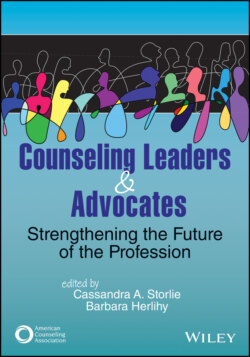Читать книгу Counseling Leaders and Advocates - Группа авторов - Страница 18
Getting the Most Out of This Book
ОглавлениеWe believe you will get the most out of this book by having some brief, introductory knowledge about leadership theory and philosophy. Most notably in the counseling profession, you will come across the term servant leadership, which was first introduced by Robert Greenleaf in 1970. Greenleaf believes leadership begins with wanting to serve, and this service is followed by aspiring to lead. Servant leadership “shares power, puts the needs of others first and helps people develop and perform as highly as possible” (Center for Servant Leadership, 2020). Eva et al. (2019) described servant leadership as “a holistic leadership approach that engages followers in multiple dimensions (e.g., relational, ethical, emotional, spiritual), such that they are empowered to grow into what they are capable of becoming” (p. 111). Greenleaf (1970) emphasized how servant leaders help others grow and “become healthier, wiser, freer, [and] more autonomous” (p. 15). Servant leaders have a strong impact on the community and on their followers, and they inspire others to become servant leaders.
Servant leadership blends well with the underpinnings of the counseling profession—taking care of others and helping others to develop. Although servant leadership is often described as the core of counseling leadership practices, it is important to acknowledge that counselors embrace a variety of leadership theories. You will find a few of the following theories woven into the stories of our profiled leaders.
